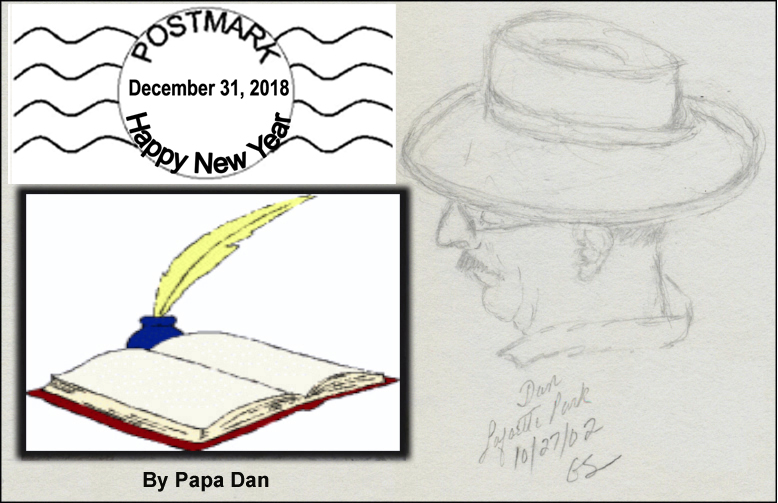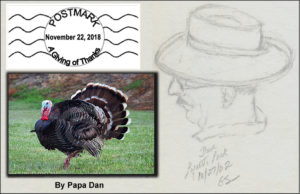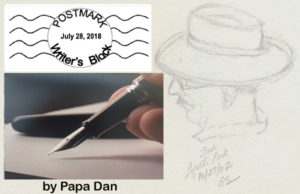Archive for Uncategorized
Fragments in Search of Wholeness

Click here to download a PDF of this story: =90-ConVivio_Fragments_Dec31_2018
= = = = = = = = = = = = = = = = = = = = = = = = = = = = = = = = = = = = = = = = = =
On Trying to Write Something During All of This Holiday Excitement:
Let’s Call It “Fragments in Search of Wholeness”
I read somewhere that this season spanning the time of Thanksgiving, The Winter Solstice, and the New Year is a time for reflection. Here in America., the season has a long and varied legacy, wrapped up in ancient and modern traditions, both religious and secular — traditions like Christmas, Hanukkah, Kwanzaa, Boxing Day, “Festivus for the Rest of Us,” and the coming of the New Year. All are wrapped up in that ‘reflective’ notion for the diverse population that inhabits this (and other) continent(s).
Here in my backyard, it certainly is. The breeze blowing through my birch trees finds very few leaves remaining to drop on my lawn. The sun is shining today but the air is cold-ish (by California standards). I have the privilege of sitting in the middle of all this, in a season when we Americans traditionally congratulate ourselves with wine, food, music, and … wine. The season is long — we give thanks, we celebrate important arrivals, we repeat traditional stories rooted in our immigrant heritage from around the world, and we celebrate the turning of calendar pages.
Here I am in my backyard with my notebook, drifting, reflecting – on the events of the season . . . oh and yes, I had hoped to write something. But what? Like other writers, I tend to look for wholeness — trying to assemble related pieces, identify patterns, and wrap them up in a single package: a theme that may answer my “So what?” question. This day, my mind is filled with fragments. I wonder if they will add up to something useful. Let’s find out.
Fragment #1: Remembering Turkeys
A couple of mornings before a Thanksgiving gone by, shortly before I had retired from a three-decade career at The Lab, I walked out of my parking lot at work, as I did every morning, toward the portal where I ‘badge in’ to cross the courtyard into my building. As I approached, my attention was diverted by scattered gobbling sounds that greeted me from inside the fence. This not being a usual sound for my walk into work, I stopped to stare awhile at seven large wild turkeys — turkeys — foraging in the groundcover along the fence. As I stopped to watch, six of the turkeys waddled away toward the middle of the courtyard and initiated a preparatory chorus of gobbling and squawking until one of them, apparently the leader, turned back toward me, began flapping his wings and running toward the inside of the fence. The others followed his lead, as if running for their lives, flapping their wings ferociously. As they lifted off and passed over the fence and scattered over my head in six different directions, I noticed that the seventh turkey had not moved. He was still foraging head down in the groundcover by the fence. As his colleagues passed overhead, he looked up with a loud squawk and began pacing back and forth along the fence, clearly agitated. I imagined, of course, that he was angry at being left behind.
Fast forward now to the Monday morning after Thanksgiving. During my usual walk into the courtyard, to my disappointment I neither heard nor saw any turkeys. None. My imagination reviewed the possibilities and considered a question: the week before, were the six turkeys who had spread their wings and cleared the fence the winners? Were they the smarter, more adventurous turkeys who figured out how to find a better life outside the fence and fly out into a great unknown to become something greater than they had been, like my immigrant grandparents? OR did these six who flew believe they had escaped the Thanksgiving dinner table, leaving behind a patsy to take the fall for the rest of them? Or were they the cowards, attempting to escape danger but inadvertently flying off into danger leaving a lucky one behind to strut another day? If HE was the winner, where was he today? Had he earned the privilege of staying inside the fence, where turkeys are not threatened, EVEN during Thanksgiving week? But, where was he? Such were the thoughts to which I turned on a dismal Monday morning after the Thanksgiving weekend.
I’m still sitting in my back yard — reflecting — as we are expected to do here in the “dead” of winter. In trying to assemble a broader theme to write about, I ask myself the question: who is wiser, one who follows a hopeful crowd to escape into a life of freedom and adventure? Or the one who thinks he knows better, the one who thinks he can make a life for himself in a place others have abandoned? I suppose that question can be applied to other migrants, perhaps those gathering at the Tijuana border we read about in the news today.
Again, still drifting here in my back yard, the turkey story leads me to a second fragment.
Fragment #2: The Greater Fool
The “Greater Fool Theory,” in economics, describes a circumstance where the value of something is not driven by intrinsic qualities, but driven by a person’s willingness to take a risk, and buy something expensive, speculating that subsequent buyers will be willing to pay a higher price for it. Such a buyer attempts to justify the price he pays with the belief that a “greater fool” will be willing to pay an even higher price. Real estate operates on this theory, as does the stock market. The greater fool is someone with the perfect blend of self-delusion and ego to think that he can succeed where others have failed. This country was created by such … uh … “fools.”
Two competing examples illustrate that such a risk-taker may or may not be the beneficiary of his own strategy. Some time ago, hedge fund manager Steven Cohen offered artworks at an auction that he had acquired through private transactions. Art experts reported in The New York Times that he foolishly “paid way too much for them, thousands more than they were worth.” ‘Thousands,’ they said. The Times reported a week later that he sold the collection for $80 million. $80 million. Not bad for a purchase described by experts as “foolish.”
In a counter example, many of the founders of our country chose to take a giant risk in hopes of creating a better life for themselves, their families, and their descendants. Fifty-six men, men of property with lots to lose, signed Jefferson’s Declaration of Independence, pledging on paper “our lives our fortunes and our sacred honor.” Historians have written that, of the 56 signers, five were captured by the British and tortured as traitors before they died. Twelve saw their homes ransacked and burned. Some had sons killed in the war or captured. Nine of the 56 signers died from wounds or hardships of the war. These ‘greater fools’ chose that role for themselves. Those who profited from their sacrifice came later on — you know, you and me.
So, I’m still sitting here in my backyard looking for a way to assemble these fragments into a piece of writing, asking my usual “So what? question. Well, nothing yet. Still thinking.
So, more fragments appear.
Fragment #3: America in fragments
Like most writers, I tend to read a lot — spending a lot my time reading and writing. While these two habits historically go hand in hand, they also seem to interfere with each other. And, what I have been reading has been a study in contrasts — not necessarily likely to contribute to an effort to assemble unifying themes here in my back yard. I have been reading two books.
Michelle Obama’s memoir “Becoming” is a wonderful study of the triumphant path of a young African-American girl who grew up on the South Side of Chicago in the 1960s, graduated from Harvard Law School in the 1980s, and lived in the White House for eight years as America’s First Lady. Today, still in the progress of becoming, she is one of the most admired women in America here in the 21st century (click here for the story). Her book is uplifting and conducive to optimism. A nation and a culture in which this story is possible seems like a good place to be.
Alongside that, I have also been reading Major Garrett’s new book “Mr. Trump’s Wild Ride.” This engaging book is one of those “first drafts of history” that high-quality reporters can provide from their vantage point deep inside the news — if they’re any good, and Mr. Garrett is that good. With close attention to detail, and access to the inner workings of the stories he tells, he allows the first-person accounts of the players in this drama to reveal the contradictions, the absence of good intentions, and the truly alarming and counterproductive directions in which the executive branch of our government is being steered. This is careful reporting — not opinion.
So, for me, the sharp contrast has been to read about the success of good people with good intentions who work hard — in Michelle’s book — against the backdrop of the chaos and cognitive dissonance that truly corrupt leaders and their valueless colleagues can create when we let them — in Garrett’s book. Both books are educational. Both illustrate what is possible in America, given the broad spectrum of humanity that exists here. Both teach powerful lessons.
When we look at these conflicting fragments of American society, it may be hard to explain how the Obama story and the Trump story can exist in the same society and operate at the highest levels of American power and influence at this remarkable period in our history. Perhaps the simultaneous existence of these two fragments tells us more about who we are than anything else I have seen. To understand America today, it seems that we have to look closely at both of these fragments. We cannot ignore either of them and claim to have examined a complete picture of America here in this early part of the 21st century.
I warned you my reflections might just be fragments, here in my backyard among the bare branches and chill wind. And, it seems that the fragments that emerged did not converge as I had hoped. In fact, they seem to diverge, much as the six turkeys did after clearing the fence back at The Lab. Just fragments.
And so I ask my annoying “So what?” question. In the writerly world of ‘unifying themes,’ maybe today isn’t my day. As Vince Lombardi used to say, “Some days you eat the bear; and some days the bear eats you.” So finally, trying to reflect on the values of this season, I find myself … feeling grateful.
Reflecting On Giving Thanks
In some years, the privilege of being “The Grandpa” at holiday events — whether it is November, December, or (barely) January — is that I get to raise my glass as soon as the plates are full and say a few words. The obvious first task is to decide which of our many benefits and blessings to highlight – for there are so many. And, a small detail, perhaps — whom to thank? So, left with fragments, I will once again do the obvious thing and steal some words from another Italian.
Five hundred years ago, Galileo Galilei, expressed his thanks this way:
“The sun, with all of its planets revolving around it, and depending upon it,
still can find the time to ripen a bunch of grapes
as if it had nothing else in the universe to do.”
I give my thanks to THAT source of goodness, which has given us everything we are and everything we have – fragments and all – including each other, since so many are not so fortunate as we, and it seems, we have so much.
Maybe in 2019 we will move past the fragments and, with the help of the family and friends we gather around us, maybe we can bring together some wholeness that we can all be proud of.
Happy Holidays to us all. ![]()
A Small Giving of Thanks

“Thanks to all of our favorite turkeys.”
— PapaTurkey”
Click here to download a PDF of this story:
ConVivio_Thanksgiving_2018
= = = = = = = = = = = = = = = = = = = = = = = = = = = = = = = = = = = = = = = = = =
Today, I want to sweep aside all of the news of the day and offer my Thanks for what we have — the most important of which is ‘each other.’
To start with, I want to take a moment to appreciate the privilege of sitting at a Thanksgiving table as part of three generations of family who live in the world today. As with most American families, those of us who sit at today’s table are the products of a legacy that endures after many generations who have gone before us, and converge in those of us who are here, right now. We don’t often get to sit at such a table with all of the members of those generations at once, but we can certainly be together in spirit.
I congratulate all of you who are assembling with your own collection of people who are important to you — friends and relatives alike. May you enjoy the privilege of being together, wherever you gather, with your favorite food and drink.
I also want to thank the many of you who read ConVivio and offer your thoughts and ideas about the topics you find there. You have been very kind to spend time reading my words and responding one way or another. I appreciate it!
Enjoy it all, for, when we gather with those good people, we have much to appreciate.
With much affection,
Dan & Gretta
![]()
![]()
Trying To Make It Better

Hey, Jude, don’t make it bad.
Take a sad song and make it better.”
— Paul McCartney
Recently I wrote something called “Interruptions,” reflecting on the continuous drumbeat of tragic stories that emerge from the daily news. Every day, it seems, we hear another new piece of bad news piled on top of the unraveling stories of bad news from previous days. I read “Interruptions” in public at The Whistlestop Writers meeting here in the Tri-Valley. From the reaction, it seemed to have resonated with members of the audience. However, on reflection, I think even my central question — “What should I do about it?” — only made us feel worse about the things happening in our world these days. Gretta asked me, and I had to ask myself, “Was it a good thing to inflict such thoughts of harm and futility on my audience? Were they any better for it? Was I? Or did I just contribute to how bad we all feel about the world around us? One day’s bad news may distract us from yesterday’s bad news – or last week’s. More often, I fear, the accumulation of stories has a “multiplier effect.” In short, did I just make it worse?
Yep. Maybe so. I decided not to publish it on ConVivio.

So, the resulting “Writer’s Block” (pictured here) has me looking for something else to think about and something else to write about. So, here is a quick start — just a start. Just little things. It’s brief. We’ll see if this approach leads anywhere.
Some News That’s Not Bad
Caught on “smart doorbell” camera, kids return wallet with $700 inside.
http://abc7news.com/society/caught-on-camera-kids-return-wallet-with-$700-inside/3835550/
Small American town welcomes refugees with Southern Hospitality.
https://www.today.com/news/clarkston-georgia-home-thousands-refugees-t132421
There’s a new Alzheimer’s/dementia drug that’s showing promise in slowing memory loss in early clinical trials.
https://www.nytimes.com/2018/07/25/health/alzheimers-dementia-drug-treatment.html
A generous anonymous donor reveals her identity. She gave millions to artists without taking credit for the gifts.
https://www.nytimes.com/2018/07/20/arts/design/susan-unterberg-artist-grant.html
A British supermarker chain is introducing a “quieter hour” for autistic shoppers.
https://www.nytimes.com/2018/07/19/world/europe/uk-supermarket-autism-morrisons.html
An experiment with a four-day work week is a surprising success.
https://www.nytimes.com/2018/07/19/world/asia/four-day-workweek-new-zealand.html
Tourist accidentally pays 100 times taxi fare— driver tracks him down to return it.
https://www.goodnewsnetwork.org/when-tourist-accidentally-pays-100-times-his-taxi-fare-driver-tracks-him-down-to-return-it/
Riders of dirt bikes and all-terrain vehicles, illegal in most cities, have found a community.
https://www.nytimes.com/2018/07/25/nyregion/dirt-bikes-bike-life-ride.html
Recovering addict anonymously pays for ambulance crew’s breakfast.
https://www.goodnewsnetwork.org/recovering-addict-anonymously-pays-for-ambulance-crew-eating-breakfast/
Surprising solution: saving a country from wildfires with goats.
https://www.goodnewsnetwork.org/goats-the-surprising-solution-to-saving-a-country-from-wildfires/
There’s a lake of liquid water on Mars.
https://www.nytimes.com/2018/07/25/science/mars-liquid-alien-life.html

A mother duck is caring for 76 ducklings on Lake Bemidji in Minnesota.
https://www.nytimes.com/2018/07/24/science/merganser-ducklings-photo.html
Today, right now, across the world, something good is happening — whether or not we hear about it or acknowledge it as something good. And, as Walter Cronkite used to say at the end of The Six O’Clock News back in the 1960s, “And that’s the way it is.”
And, there’s more …
Your comments on this topic are welcome. ![]()